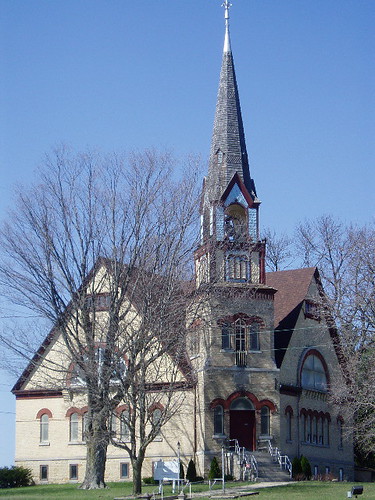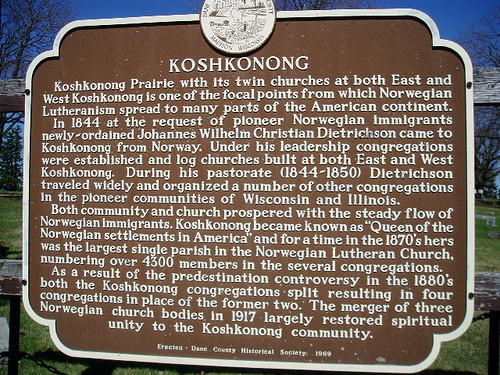Yesterday I ran my longest pre-race training run, 15 miles, and lost my toenail on my right big toe in the last two miles or so. All that pounding. When you head out for a jog that is longer than two hours, there's a while different phenomenon that occurs mentally and physically. For one, all the pounding does strange things to your body. Second, you can smell ammonia at the end of your run. Third, your mind just kind of blanks out and absorbs the hours. It doesn't seem long at all.
I'm still taking pledge for the run to benefit Lutheran Immigration and Refugee Service. The national office is even doing a fund-raiser for my run. Visit www.eastkoshkonong.org and get our church address if you'd like to make a gift.
Tuesday, April 26, 2005
Monday, April 25, 2005
Resolutions for the Assembly
In some ways this may be an oversimplistic post. Nevertheless, here's my observation. The major resolutions before the Churchwide Assembly in Florida are as follows:
1) Sexuality statement
2) Full communion study with United Methodists
3) Renewing Worship materials
4) Our "mission" proposal (which has mostly to do with structures and finances)
5) Diversity statement
By and large, I am not opposed to us pursuing these topics and studies and making statements on them as a church. But my frustration lies in the fact that they all focus exclusively on church practice, as if the most worthy things worth talking about as a church are ecumenical agreements, church structure, etc.
When I look at the confessional documents, they consistently start with confessions about the doctrine of the faith (Chief Articles of the Faith). In fact, that is their focus. Issues of practice are placed at the end of AC, in the area entitled "Abuses Corrected".
So, my question: Why do we not discuss in assembly the Articles of the Faith?
1) Sexuality statement
2) Full communion study with United Methodists
3) Renewing Worship materials
4) Our "mission" proposal (which has mostly to do with structures and finances)
5) Diversity statement
By and large, I am not opposed to us pursuing these topics and studies and making statements on them as a church. But my frustration lies in the fact that they all focus exclusively on church practice, as if the most worthy things worth talking about as a church are ecumenical agreements, church structure, etc.
When I look at the confessional documents, they consistently start with confessions about the doctrine of the faith (Chief Articles of the Faith). In fact, that is their focus. Issues of practice are placed at the end of AC, in the area entitled "Abuses Corrected".
So, my question: Why do we not discuss in assembly the Articles of the Faith?
Tuesday, April 19, 2005
Thursday, April 07, 2005
Sunday, April 03, 2005
REAL ID Act
LIRS/ECLA Letter sent to the Senate re: REAL ID Act:
March 31, 2005
Dear Senator:
TheEvangelical Lutheran Church in America (ELCA) and Lutheran Immigration and Refugee Service (LIRS) urge you to oppose the REAL ID Act (H.R. 418), which the House included in its fiscal year 2005 supplemental spending bill.The REAL ID Act would hurt the most vulnerable immigrants -- asylum seekers, torture victims, unaccompanied children and immigrant families. Under the asylum provisions in this bill, many refugees who have fled human rights abuses including religious persecution, torture, rape and other horrific violence could be barred from receiving asylum in the United States.
Lutheran churches have a history of hospitality for refugees. Following World War II, when one out of every six Lutherans in the world was a refugee or displaced person, Lutherans, with the participation of 6,000 congregations, resettled some 57,000 refugees in theUnited States. To this day we continue to welcome refugees, asylum seekers and other immigrants into our congregations. Newcomer immigrants remind us of our earlier generations who entered this country throughAngelIsland,Ellis IslandandMiami. This ministry also teaches us how our society is daily being strengthened and renewed by the contributions of newcomers.
Let us be clear: we are deeply committed toU.S.national security. Terrorism haunts our times. We understand the difficult decisions members of Congress must make in order to balance our national security with other responsibilities of government and with the very ideals on which this great nation was founded. H.R. 418 would not protect us from terrorism. Terrorists are already barred from receiving asylum in theUnited States. Instead, this bill would harm the most vulnerable refugees who come to theUnited States seeking protection and the liberty and freedom we so deeply cherish as a nation.
TheUnited States must balance our need for security with our tradition of humanitarian relief to persecuted people. H.R. 418 would close the door of freedom to people most in need of our protection. Specifically, we object to the following provisions in H.R. 418:
· Section 101 could deny asylum to a refugee if he or she is unable to show documents that prove his or her case, even though he or she has testified credibly in the asylum case.
· Section 101 requires a refugee to prove that a "central reason" for the persecution was race, religion, political opinion, nationality or membership in a particular social group as opposed to personal vengeance, hatred or some other reason. It is unrealistic to require victims to read the mind of their persecutors. Section 101 also places emphasis on the refugee's perceived demeanor, ignoring the fact that survivors of rape, forced abortions or similar abuses may appear lacking in emotion or have difficulty making eye contact.
· Sections 103 and 104 allow victims of terrorist or militant groups to be deported or barred from receiving asylum based on overly broad definitions of what constitutes engaging in terrorism. Some people who come to theUnited Statesseeking asylum are doing so because they were forced at gunpoint to pay money to a terrorist organization or may have given money to a school or hospital without knowing the ties to a terrorist organization. Under the REAL ID Act, these innocent people would be barred from asylum for the same reason they are seeking it -- persecution by terrorists.
· Section 202 would undermine states' efforts to create driver's license systems that assure that all drivers are certified to drive, are insured, and are carrying valid licenses. Undermining these efforts would force undocumented people further into the shadows, and weaken rather than improve security.
The presence of immigrants in our churches and society heightens our awareness of the experience of new immigrants, refugees and asylum seekers in theUnited States. This awareness makes us more appreciative of the gifts our new neighbors bring and of the barriers as well as the opportunities they encounter. It deepens our belief that "all people are God's creatures, sinners for whom Christ died" and our responsibility to respect the human dignity of all.
Recalling that our families were once "strangers" -- and remembering our Lord's call to love our neighbor as ourselves -- enables us to see the new "strangers" as our neighbors, and makes us open to welcome today's newcomers. We urge you to oppose H.R. 418 to ensure theUnited Statescontinues to welcome the stranger and provide protection to the persecuted.
Our nation's founding father, George Washington wrote,
At best, I have only been an instrument in the hands of Providence to effect, with the aid of many virtuous fellow citizens of America, a revolution which is interesting to the liberties of mankind -and to the emancipation of a Country which may afford an asylum (if we are wise enough to pursue the paths which lead to virtue and patriotism) to the oppressed and needy of the earth. Our land is extensive - our plains are productive - and if they are cultivated with liberality and good sense, we may be happy ourselves, and diffuse it to ask those who incline to participate of it.
-- Letter from General George Washington to Mevr. Lucretia Wilhelmina van Mercken, March 30, 1783
Faithfully,
Bishop Mark S. Hanson Ralston H. Deffenbaugh, Jr.
Presiding Bishop President
EvangelicalLutheranChurchinAmerica Lutheran Immigration and Refugee Service
March 31, 2005
Dear Senator:
TheEvangelical Lutheran Church in America (ELCA) and Lutheran Immigration and Refugee Service (LIRS) urge you to oppose the REAL ID Act (H.R. 418), which the House included in its fiscal year 2005 supplemental spending bill.The REAL ID Act would hurt the most vulnerable immigrants -- asylum seekers, torture victims, unaccompanied children and immigrant families. Under the asylum provisions in this bill, many refugees who have fled human rights abuses including religious persecution, torture, rape and other horrific violence could be barred from receiving asylum in the United States.
Lutheran churches have a history of hospitality for refugees. Following World War II, when one out of every six Lutherans in the world was a refugee or displaced person, Lutherans, with the participation of 6,000 congregations, resettled some 57,000 refugees in theUnited States. To this day we continue to welcome refugees, asylum seekers and other immigrants into our congregations. Newcomer immigrants remind us of our earlier generations who entered this country throughAngelIsland,Ellis IslandandMiami. This ministry also teaches us how our society is daily being strengthened and renewed by the contributions of newcomers.
Let us be clear: we are deeply committed toU.S.national security. Terrorism haunts our times. We understand the difficult decisions members of Congress must make in order to balance our national security with other responsibilities of government and with the very ideals on which this great nation was founded. H.R. 418 would not protect us from terrorism. Terrorists are already barred from receiving asylum in theUnited States. Instead, this bill would harm the most vulnerable refugees who come to theUnited States seeking protection and the liberty and freedom we so deeply cherish as a nation.
TheUnited States must balance our need for security with our tradition of humanitarian relief to persecuted people. H.R. 418 would close the door of freedom to people most in need of our protection. Specifically, we object to the following provisions in H.R. 418:
· Section 101 could deny asylum to a refugee if he or she is unable to show documents that prove his or her case, even though he or she has testified credibly in the asylum case.
· Section 101 requires a refugee to prove that a "central reason" for the persecution was race, religion, political opinion, nationality or membership in a particular social group as opposed to personal vengeance, hatred or some other reason. It is unrealistic to require victims to read the mind of their persecutors. Section 101 also places emphasis on the refugee's perceived demeanor, ignoring the fact that survivors of rape, forced abortions or similar abuses may appear lacking in emotion or have difficulty making eye contact.
· Sections 103 and 104 allow victims of terrorist or militant groups to be deported or barred from receiving asylum based on overly broad definitions of what constitutes engaging in terrorism. Some people who come to theUnited Statesseeking asylum are doing so because they were forced at gunpoint to pay money to a terrorist organization or may have given money to a school or hospital without knowing the ties to a terrorist organization. Under the REAL ID Act, these innocent people would be barred from asylum for the same reason they are seeking it -- persecution by terrorists.
· Section 202 would undermine states' efforts to create driver's license systems that assure that all drivers are certified to drive, are insured, and are carrying valid licenses. Undermining these efforts would force undocumented people further into the shadows, and weaken rather than improve security.
The presence of immigrants in our churches and society heightens our awareness of the experience of new immigrants, refugees and asylum seekers in theUnited States. This awareness makes us more appreciative of the gifts our new neighbors bring and of the barriers as well as the opportunities they encounter. It deepens our belief that "all people are God's creatures, sinners for whom Christ died" and our responsibility to respect the human dignity of all.
Recalling that our families were once "strangers" -- and remembering our Lord's call to love our neighbor as ourselves -- enables us to see the new "strangers" as our neighbors, and makes us open to welcome today's newcomers. We urge you to oppose H.R. 418 to ensure theUnited Statescontinues to welcome the stranger and provide protection to the persecuted.
Our nation's founding father, George Washington wrote,
At best, I have only been an instrument in the hands of Providence to effect, with the aid of many virtuous fellow citizens of America, a revolution which is interesting to the liberties of mankind -and to the emancipation of a Country which may afford an asylum (if we are wise enough to pursue the paths which lead to virtue and patriotism) to the oppressed and needy of the earth. Our land is extensive - our plains are productive - and if they are cultivated with liberality and good sense, we may be happy ourselves, and diffuse it to ask those who incline to participate of it.
-- Letter from General George Washington to Mevr. Lucretia Wilhelmina van Mercken, March 30, 1783
Faithfully,
Bishop Mark S. Hanson Ralston H. Deffenbaugh, Jr.
Presiding Bishop President
EvangelicalLutheranChurchinAmerica Lutheran Immigration and Refugee Service
Saturday, April 02, 2005
The Pope
Requiem aeternam dona eis, Domine;
et lux perpetuam luceat eis.
Kyrie eleison. Christe eleison.
et lux perpetuam luceat eis.
Kyrie eleison. Christe eleison.
Subscribe to:
Posts (Atom)


